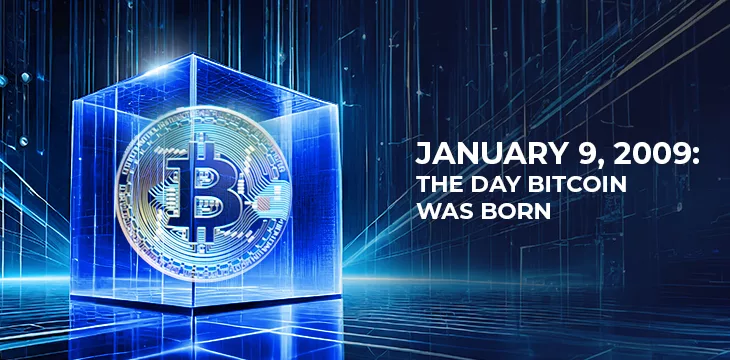|
Getting your Trinity Audio player ready...
|
This January 9, Bitcoin officially turned 15! Those of us who have been following the development of the electronic cash system that changed the world have witnessed many twists and unexpected turns, and it’s important to stop and celebrate the milestones along the way.
In Mexico and some other Latin American cultures, the 15th birthday holds special significance. Known as Quincea, the 15th birthday is especially significant for young women, with a family feast and a ritual replacement of a flat shoe for a high heel marking her transition to womanhood.
Indeed, on its fifteenth birthday, Bitcoin is entering adulthood, too! As it scales to enterprise levels and is capable of evermore transactions and use cases, let’s take a quick walk down memory lane to relive some of the key moments in Bitcoin’s development.
Bitcoin—the journey so far
January 3 – Satoshi Nakamoto hardcoded the Genesis block, which contains unspendable coins, on this date. Others weren’t yet able to participate or mine blocks. In fact, Satoshi didn’t mine this block either. It’s different from all the others because it acts as an anchor for the rest of the blocks in the blockchain.
January 9 – This is when Satoshi Nakamoto, released Bitcoin v0.1 to the world. He said it was set in stone.
The nature of Bitcoin is such that once version 0.1 was released, the core design was set in stone for the rest of its lifetime. – Satoshi Nakamoto
January 12 – Satoshi Nakamoto sent the first Bitcoin transaction to Hal Finney on this date. While Finney has long been held in esteem by Bitcoiners, he has been ruled out as a Satoshi Nakamoto candidate, and his late wife has recently requested that others stop saying he was Bitcoin’s inventor.
"It was a bad end to his life. I will always resent that."
If you are someone who once thought/thinks Hal Finney may be Satoshi Nakamoto, it's worth taking a few minutes to watch this powerful clip of @franfinney opening up about what those claims have done to their family. Her… pic.twitter.com/ywG11ef68O
— Natalie Brunell ⚡️ (@natbrunell) January 5, 2024
April 23, 2011 – After patiently explaining Bitcoin in every way, in which he said it could scale bigger than Visa (NASDAQ: V) with existing hardware, he told us that nodes would end up in specialized server farms and outlined his vision for a global electronic cash system capable of micropayments, Satoshi sent a final message to Mike Hearn and disappeared soon after.
August 1, 2017 – After Satoshi’s disappearance, rogue actors and misguided idealists hijacked the vision for Bitcoin, pitching it as some sort of digital gold or settlement system. The network ultimately split on August 1, 2017, leading to the creation of the BCH ticker. Later, in November 2018, the network split again, and BSV became the ticker for the original protocol.
On its 15th birthday, it’s abundantly clear that Satoshi’s vision for a scalable electronic cash system that facilitates small, casual transactions is alive and thriving. BSV is the original Bitcoin, and it is scaling to unbounded levels onchain.
What do the next 15 years hold?
If the last 15 years have taught us anything, it’s that the Bitcoin journey is unpredictable. Right now, there are three distinct camps, but when we analyze the economics of all three chains, it’s clear that BSV will emerge victorious in the long run.
Whatever one might think of BSV, there’s no denying that big blocks full of millions and billions of micropayments will inevitably outlive small ones with an ever-diminishing block reward. After the upcoming halving, BTC miners will have to decide whether the light is worth the candle, and users will have to decide if ever-increasing fees are really worth it.
Will BTC still exist in 15 years? Probably in some form. However, the dragon has been unleashed, and BSV is unstoppable. I, for one, can’t wait to see what the next 15 years bring. It’s going to be amazing to witness Bitcoin reaching its full potential!
Watch: Here’s how Bitcoin works as the base layer for other blockchains

 08-24-2025
08-24-2025 





